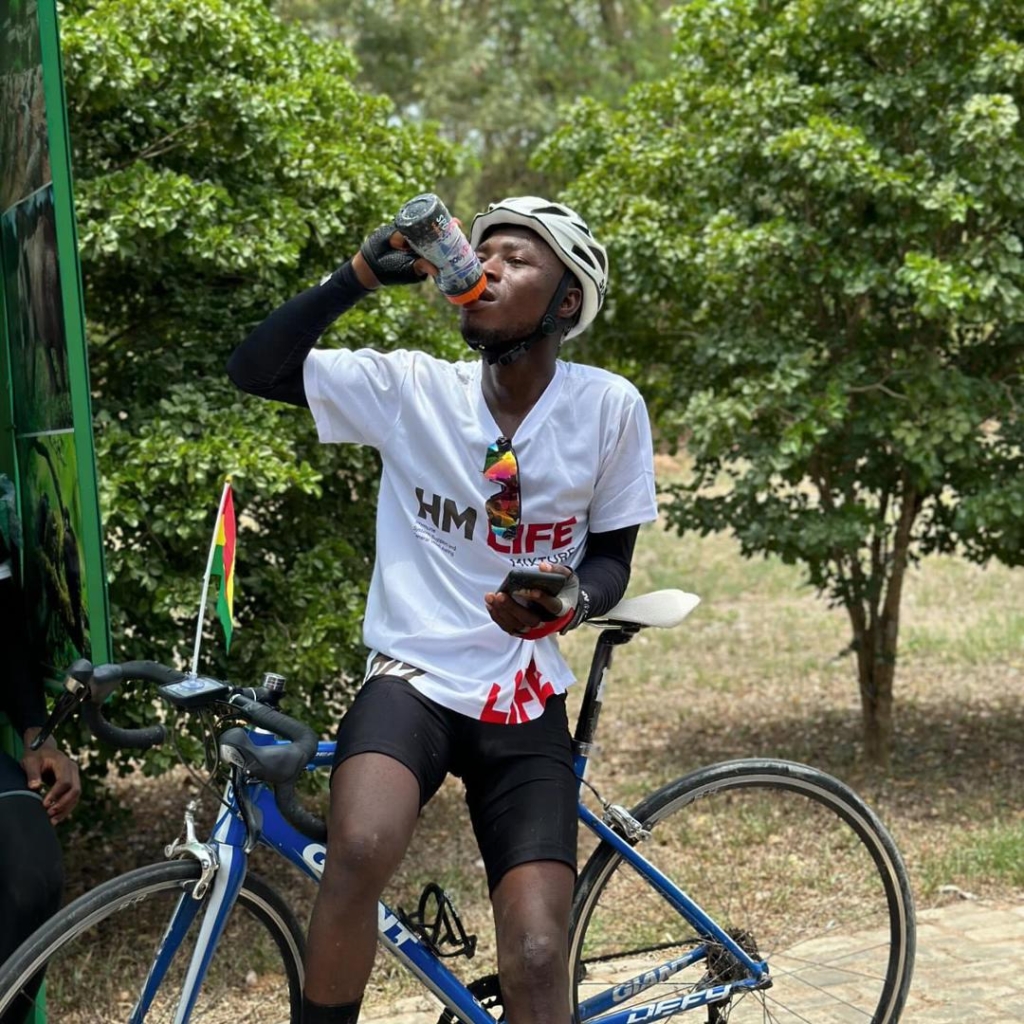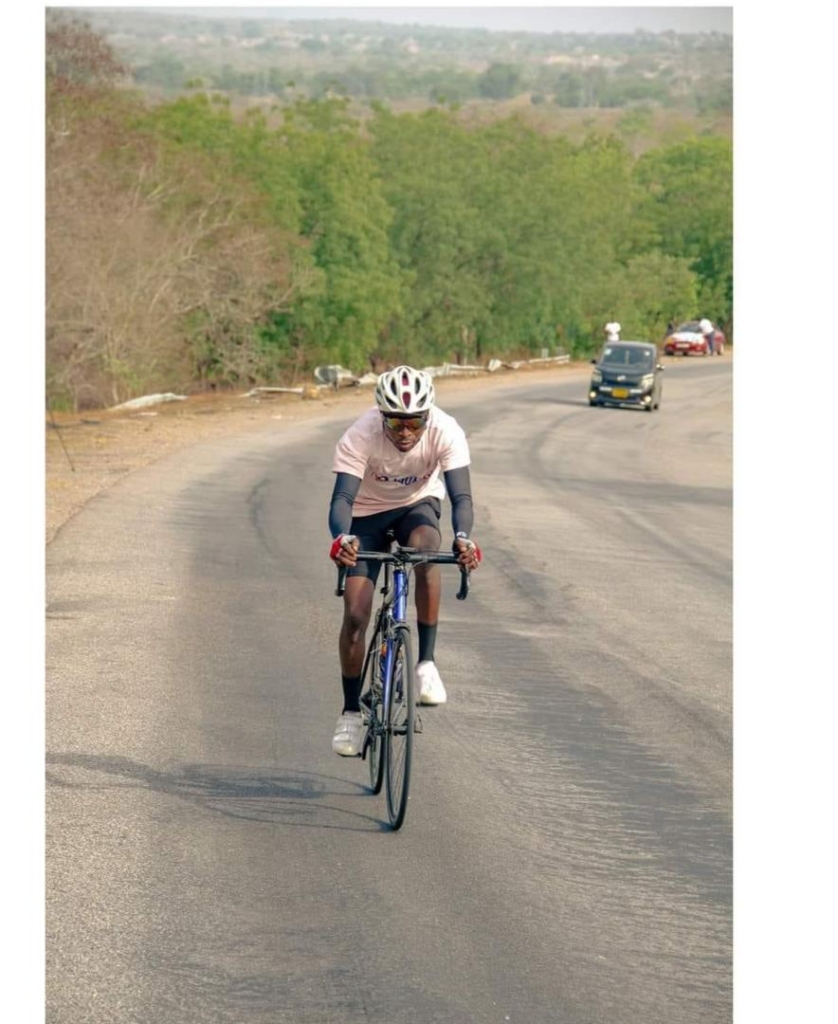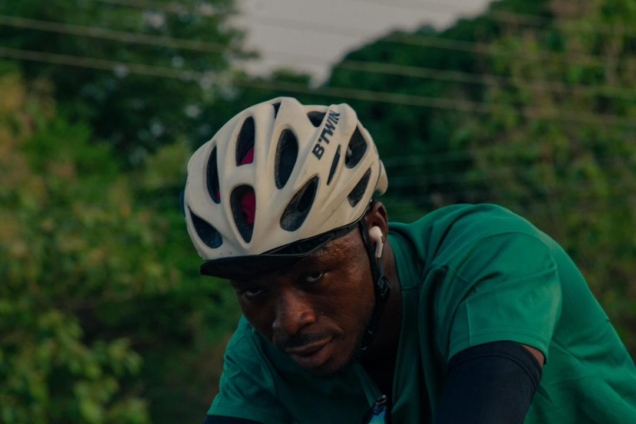As the sun lights up Bolgatanga, 28-year-old James Kumbeni readies himself for his trip to Accra, the capital of Ghana. Rather than relying on a bus or car, the gentle whir of his bicycle chain fills the air. With each pedal rotation, he embarks on a journey that not only carries him to his destination but also reduces his environmental impact.
For three years, James has been cycling to mentally and physically ready himself for a ride to Accra, aiming to raise awareness about clean air.
“I have been cycling for 3 years now. This has strengthened and prepared me physically. The course for the ride gave me motivation. Riding to create awareness of clean air was a big motivation for me. This prepared me mentally,” he said.
James faces a choice between convenience and environmental responsibility. Choosing the latter means committing to a series of pedal revolutions to reach his destination. His goal is to advocate for the bicycle as an alternative mode of transportation to decrease carbon emissions and improve the quality of the air. Also, his ride serves as a platform to raise awareness about safety measures for cyclists.
It's estimated that one pedal revolution covers about 0.00431 kilometers for James's bicycle, the giant bike. This represents the linear distance the bike moves forward with each full rotation of the pedals. However, this distance can vary depending on factors such as wheel size, gear ratio, and drive train efficiency.

Cycling experts note that larger wheels generally cover more ground per revolution compared to smaller ones, and the gear ratio also influences the distance covered per pedal stroke. Understanding this distance is crucial for cyclists to gauge the effort needed to travel a specific distance and to plan their rides accordingly.
James' Pedal Count to Accra
“I was inspired to cycle 815km to promote bicycles as alternative means of transport. This way, people would start cycling to reduce vehicular use. This way, we can reduce carbon emissions. This will lead to Clean Air for all to breathe,” James spoke to JoyNews Mahmud Mohammed-Nurudeen when he arrived in Kumasi.
With a distance of 815 kilometers to cover and an estimated distance of 0.00431 kilometers per pedal revolution, James would need roughly 189,414,693 pedal revolutions for his riding expedition to Accra. Completing these revolutions in 5 days, as he did, would require an average of about 37,882,940 pedal revolutions per day. This demanding pace is likely unsustainable for most individuals, considering factors such as topography, riding conditions, and personal endurance.
Cycling experts indicate that a person can sustain a tempo of about 60-90 Revolutions Per Minute (RPM) for a moderate effort. For context, 60 RPM means completing one full revolution of the pedals each second, while 90 RPM means completing one and a half revolutions each second. Achieving the necessary pedal revolutions per day, as in James's case, would likely demand a pedaling rate significantly higher than this sustainable range.
With 37,882,940 pedal revolutions per day, about 163,187 kilometers would be covered. James's journey aligns closely with these estimates, as he covered about 162 kilometers on the first day from Bolga to Tamale, followed by 197 kilometers from Tamale to Kintampo on the second day, and 194 kilometers from Kintampo to Kumasi on the third day. On the fourth and fifth days, he traveled about 187 kilometers to Suhum and over 65 kilometers to reach Accra, respectively. James tracked his pedal revolutions throughout his journey, appreciating their significance until the final stretch.
A climate scientist at the University of Energy and Natural Resources (UENR), Dr. Caleb Mensah, commended James's initiative, highlighting that large-scale cycling events like this can significantly raise awareness of green mobility and the environmental advantages of cycling. This increased awareness could potentially result in a temporary decrease in air pollution as more individuals opt for bicycles over motor vehicles.
“However, when organized as large events (as people mostly want to do), cycling can have negative impacts, particularly with marathon-style or extensive outdoor activities involving many participants. These include carbon emissions from travel, significant resource consumption, and waste generation. Effective planning and sustainability management, such as waste recycling and resource minimization, are essential to mitigate these impacts,” he said.

How James Cycling Spares Estimated 188.365kg CO2 Emissions
If James had chosen a saloon car to travel from Bolga to Accra, it is estimated that he would have emitted about 188.365 kilograms of carbon dioxide (CO2) into the atmosphere. To calculate the greenhouse gas emissions produced by such a vehicle for a distance of 815 kilometers, factors such as the vehicle's fuel efficiency and the emissions generated from burning fuel need to be taken into account.
The fuel efficiency of a car can change depending on factors such as the model year, engine specifications, driving conditions, and maintenance. Assuming a standard fuel efficiency of 10 kilometers per liter (km/L) for a typical Toyota Corolla, the car would need about 81.5 liters of fuel to cover a distance of 815 kilometers. This calculation is derived by dividing the distance traveled (815 km) by the fuel efficiency (10 km/L), resulting in 81.5 liters.
The amount of greenhouse gas emissions produced by burning fuel depends on the type of fuel and its carbon intensity. Petrol, commonly used in vehicles, emits about 2.31 kilograms of CO2 per liter when burned. The total greenhouse gas emission is determined by multiplying the fuel consumption by the emission factor. Therefore, for a distance of 815 kilometers, a saloon car would produce about 188.365 kilograms of CO2 emissions.

To put it into perspective, 188.365 kilograms of CO2 is equivalent to the weight of about 188 standard bags of sugar. In terms of volume, some experts say it would fill about 114 standard-sized balloons. The estimated CO2 emission is equivalent to the emissions produced by burning about 80 liters of petrol, roughly equivalent to the fuel consumed while driving a saloon car for a distance of 815 kilometers. This therefore represents a significant contribution to climate change.
However, James opted for a different approach, one that not only enhances his health but also benefits the environment. He decided to pedal his way through the city, leaving behind no carbon footprint.
The choice to cycle extends beyond mere convenience; it serves as a potent declaration in the battle against climate change. While a single car trip emits nearly 200 kilograms of CO2, cycling produces zero emissions. By opting to pedal, James is actively aiding in the decrease of greenhouse gases, combating air pollution, and safeguarding the planet for future generations.
Dr. Mensah emphasizes that cycling substantially diminishes greenhouse gas emissions and air pollution in contrast to motorized transportation. Bicycles emit zero carbon during operation, rendering them an exceptionally sustainable mode of transport.
“While exact quantification can vary based on specific conditions, cycling consistently emerges as a superior environmental choice, especially in urban settings where short trips are common,” he added.
Impacts of cycling on public health
Cycling provides not just beneficial physical activity but also contributes to lowering obesity rates, reducing the risk of heart disease, and managing various chronic health issues. Urban and suburban areas that prioritize cycling infrastructure can encourage greater participation in cycling, leading to positive effects on public health. Efforts like those exemplified by James in advocating for cycling can be seamlessly incorporated into wider climate action initiatives.
Dr. Mensah suggests promoting cycling infrastructure such as dedicated bike lanes, safe bike parking facilities, and initiatives like bike-sharing programmes and community cycling events, which are prevalent in Europe.
“For example, Paris in France has implemented measures like closing city centers to cars during peak rush hours and designating bike-only lanes, making the city a more pleasant place to live, work, and visit. Such initiatives can be incorporated into local and national transportation plans aimed at reducing carbon footprints and enhancing sustainable urban mobility. Moreover, these efforts can drive policy changes, fostering a culture that supports active, eco-friendly transportation,” he emphasized.
He points out that cycling helps alleviate urban traffic congestion since bicycles require less space than cars, resulting in decreased road usage and parking requirements.
“This shift from cars to bikes can lead to quieter, less congested, and more efficient cities. Additionally, cycling improves urban livability by creating safer, more accessible environments and enhancing the aesthetic and social appeal of cities.
“Environmentally, cycling reduces air pollution and greenhouse gas emissions, supporting cities' sustainability goals and climate action efforts. Thus, cycling is a pivotal strategy for new cities aiming to boost health, reduce congestion, improve quality of life, and minimize environmental impacts, making it an integral part of sustainable urban development,” he stated.
Challenges Hindering the Wide Adoption of Cycling as a Sustainable Transport
The broad acceptance of cycling in Ghana encounters numerous hurdles, such as insufficient infrastructure, cultural biases, economic constraints, safety concerns, and the lack of supportive regulations.
During his journey from Bolgatanga to Accra, James encountered challenges due to the absence of designated cycling lanes and exposure to vehicular pollution. He frequently had to veer off the road to steer clear of inhaling polluted air or encountering reckless drivers.
“Main challenges were smoke from vehicles really disturbed me a lot. Also, bad road was a challenge. Some drivers too were my challenge. I think drivers need to be informed that we share the road,” James narrated.
Dr. Mensah says addressing these challenges requires a multifaceted approach which include developing infrastructure such as dedicated bike lanes and secure parking, changing cultural attitudes through education and community cycling events to highlight cycling's benefits, and making bikes more affordable through government subsidies or bike-sharing programmes.
“Additionally, enhancing road safety through strict enforcement of traffic laws protecting cyclists, and establishing regulatory frameworks that incentivize cycling, is crucial. Such comprehensive strategies could significantly boost cycling as a sustainable transport option, contributing to environmental sustainability and improved urban livability in Ghana,” he said.
General Observations James made completing his Journey
During his journey through various communities en route to Accra, James noted that Ghana continues to grapple with numerous environmental issues, including water challenges and degradation. He emphasised the importance of greater involvement from individuals to collectively address these pressing environmental concerns and safeguard our surroundings.
“I saw people at different locations carrying water. It suggests that water is a common problem. Poor attitude of drivers was across all areas,” he observed.
He has also come to recognize that there is a widespread lack of awareness among people regarding climate change and the importance of clean air. “Information dissemination is key. As I interacted with communities along the road, I realized that they needed a lot of education about our environment. I spoke to them as I moved. I also love how the people were so caring and ready to listen to me.”
Latest Stories
-
Trump signs executive order extending tariff deadline to August 1
3 hours -
Midweek misery to Friday freedom: A personal journey through Ghana’s new holiday reform
3 hours -
We’re streamlining the galamsey fight, too many are running helter skelter – Mahama
3 hours -
Mahama attributes cedi stability to reforms in gold trading sector
4 hours -
Police arrest key suspect in motorbike theft ring in Accra
4 hours -
Journalists urged to drive urban health awareness through data-driven, science-based storytelling
5 hours -
KNUST Optometry 8th White Coat Ceremony tackles refractive error setbacks to improve access
5 hours -
I’m devastated – Akufo-Addo mourns Akwatia MP Ernest Kumi
5 hours -
IMF Executive Board approves $370m disbursement for Ghana
5 hours -
Castel Group acquires GGBL
5 hours -
Mr. President, your Six-Pillar 24H+ Economic Policy is shaky
5 hours -
T-bills auction: Undersubscription to continue in coming weeks; government misses June 2025 target by 19%
5 hours -
FUND24, the weakest pillar of Ghana’s 24H+ economy: APL cautions President Mahama
5 hours -
Ghana’s tourism picks up in 2024, but cost still a big issue
5 hours -
EKAJ Educational Fund partners UCC to train local artisans to improve standards
5 hours

